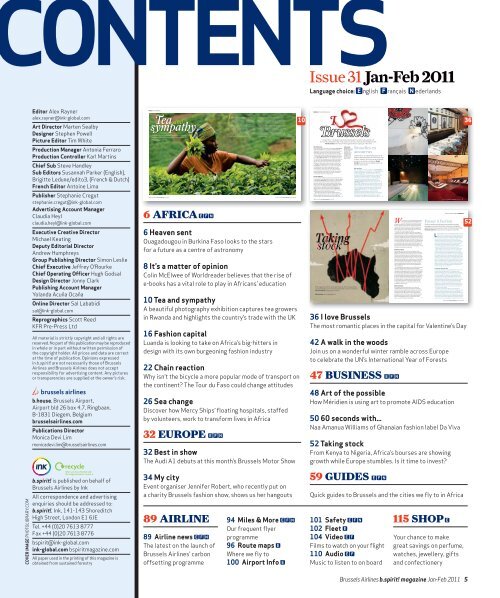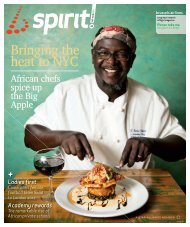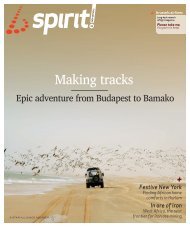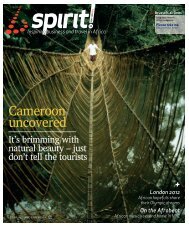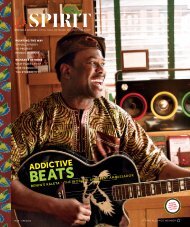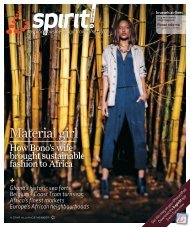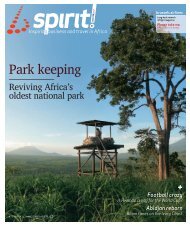Create successful ePaper yourself
Turn your PDF publications into a flip-book with our unique Google optimized e-Paper software.
COVER IMAGE PHOTOLIBRARY.COM<br />
ONTENTS<br />
Issue 31 Jan-Feb <strong>2011</strong><br />
Editor Alex Rayner<br />
alex.rayner@ink-global.com<br />
Art Director Marten Sealby<br />
Designer Stephen Powell<br />
Picture Editor Tim White<br />
Production Manager Antonia Ferraro<br />
Production Controller Karl Martins<br />
Chief Sub Steve Handley<br />
Sub Editors Susannah Parker (English),<br />
Brigitte Ledune/edito3, (French & Dutch)<br />
French Editor Antoine Lima<br />
Publisher Stephanie Cregut<br />
stephanie.cregut@ink-global.com<br />
Advertising Account Manager<br />
Claudia Heyl<br />
claudia.heyl@ink-global.com<br />
Executive Creative Director<br />
Michael Keating<br />
Deputy Editorial Director<br />
Andrew Humphreys<br />
Group Publishing Director Simon Leslie<br />
Chief Executive Jeffrey O’Rourke<br />
Chief Operating Officer Hugh Godsal<br />
Design Director Jonny Clark<br />
Publishing Account Manager<br />
Yolanda Acuña Ocaña<br />
Online Director Sal Lababidi<br />
sal@ink-global.com<br />
Reprographics Scott Reed<br />
KFR Pre-Press Ltd<br />
All material is strictly copyright and all rights are<br />
reserved. No part of this publication may be reproduced<br />
in whole or in part without written permission of<br />
the copyright holder. All prices and data are correct<br />
at the time of publication. Opinions expressed<br />
in b.spirit! are not necessarily those of Brussels<br />
Airlines and Brussels Airlines does not accept<br />
responsibility for advertising content. Any pictures<br />
or transparencies are supplied at the owner’s risk.<br />
b.house, Brussels Airport,<br />
Airport bld 26 box 4.7, Ringbaan,<br />
B-1831 Diegem, Belgium<br />
brusselsairlines.com<br />
Publications Director<br />
Monica Devi Lim<br />
monicadevi.lim@brusselsairlines.com<br />
b.spirit! is published on behalf of<br />
Brussels Airlines by Ink<br />
All correspondence and advertising<br />
enquiries should be addressed to:<br />
b.spirit!, Ink, 141-143 Shoreditch<br />
High Street, London E1 6JE<br />
Tel. +44 (0)20 7613 8777<br />
Fax +44 (0)20 7613 8776<br />
bspirit@ink-global.com<br />
ink-global.com bspiritmagazine.com<br />
All paper used in the printing of this magazine is<br />
obtained from sustained forestry<br />
* AFRICA TEA IN RWANDA<br />
Tea and<br />
sympathy<br />
A new photography exhibition celebrates the ongoing<br />
tea-growing relationship between Rwanda and the UK<br />
Photography Tim Smith<br />
6 AFRICA E F N<br />
6 Heaven sent<br />
Ouagadougou in Burkina Faso looks to the stars<br />
for a future as a centre of astronomy<br />
8 It’s a matter of opinion<br />
Colin McElwee of Worldreader believes that the rise of<br />
e-books has a vital role to play in Africans’ education<br />
10 Tea and sympathy<br />
A beautiful photography exhibition captures tea growers<br />
in Rwanda and highlights the country’s trade with the UK<br />
16 Fashion capital<br />
Luanda is looking to take on Africa’s big-hitters in<br />
design with its own burgeoning fashion industry<br />
22 Chain reaction<br />
Why isn’t the bicycle a more popular mode of transport on<br />
the continent? The Tour du Faso could change attitudes<br />
26 Sea change<br />
Discover how Mercy Ships’ fl oating hospitals, staffed<br />
by volunteers, work to transform lives in Africa<br />
32 EUROPE E F N<br />
32 Best in show<br />
The Audi A1 debuts at this month’s Brussels Motor Show<br />
34 My city<br />
Event organiser Jennifer Robert, who recently put on<br />
a charity Brussels fashion show, shows us her hangouts<br />
89 AIRLINE<br />
89 Airline news E F N<br />
The latest on the launch of<br />
Brussels Airlines’ carbon<br />
offsetting programme<br />
t’s hard to think of a more English scene than Bettys<br />
photographer Tim Smith visited the Gisovu, Mata and Kitabi<br />
tea room in Harrogate. Founded in 1919, Bettys (the name tea estates in the mountainous regions of the country, along the<br />
is written without an apostrophe) has established itself borders with Burundi and Congo. Here he discovered tea growers<br />
as the quintessential genteel tea-drinker’s restaurant. Yet for over and gatherers working alongside skilled agriculturalists, striving<br />
three decades, the café has maintained a crucial link with East to overcome the country’s recent history and draw in precious<br />
Africa. “We’ve been buying tea from Rwanda for over 35 years,” foreign trade.<br />
says company representative Samantha Gibson.<br />
In recognition of their ongoing relationship, Taylors and Bettys<br />
Thirsty customers can order Rwanda Mille Collines tea, while are matching the funding provided by the British government’s<br />
buyers of Harrogate’s Yorkshire Tea brand (produced by Taylors, Department For International Development (DFID) to help around<br />
the tea room’s sister company) might be surprised to discover that 10,000 tea farmers improve their lot. The company also plans<br />
the blend in their bags is partially made up of Rwandan leaves. to teach tea farmers and estate workers sustainable farming<br />
Although tea cultivation only began in the 1960s, the Rwandan techniques, in an attempt to safeguard both their tea production<br />
Tea Authority claims the crop is now the number-one overseas and the rainforests that surround their land. All of which might<br />
Left: Plucking tea<br />
earner, contributing up to 34% of the total national exports.<br />
cause the tea drinkers at Bettys to pause for thought as they savour on a hillside on<br />
To explore the roots of Rwandan tea production, British<br />
their afternoon cuppa.<br />
the Mata tea estate<br />
10 Brussels Airlines b.spirit! magazine Jan-Feb <strong>2011</strong> Brussels Airlines b.spirit! magazine Jan-Feb <strong>2011</strong> 11<br />
BS010-014 Photo Feature SP_AL.indd Sec1:10-Sec1:11 21/12/2010 11:35<br />
I<br />
94 Miles & More E F N<br />
Our frequent fl yer<br />
programme<br />
96 Route maps E<br />
Where we fl y to<br />
100 Airport Info E<br />
10<br />
Language choice: E nglish F rançais N ederlands<br />
* EUROPE IN THE MOOD FOR LOVE<br />
I<br />
Brussels<br />
Forget Paris – the Belgian capital is brimming with romantic wintry wonders to<br />
discover this Valentine’s Day. From comfort cuisine to cool parks and neighbourhoods,<br />
Renée Cordes seeks out the best opportunities to spoil your other half<br />
Hot hideaways<br />
Get the romance off to a good start at the elegant Le Dixseptième<br />
(25 Rue de la Madeleine, tel. +32 (0)2 517 1717, ledixseptieme.be,<br />
doubles from €200), the 17th-century former home of the Spanish<br />
ambassador, restored in 2009. The classic suites boast sitting<br />
rooms and fireplaces for cosying up, while the location is perfect,<br />
just steps from the Sablon antiques district and the Grand’Place.<br />
If you’d rather be ensconced near grand shopping street Avenue<br />
Louise, Hotel Manos Premier (100-106 Chaussée de Charleroi,<br />
tel. +32 (0)2 537 9682, manospremier.com, doubles from €345) is an<br />
oasis of calm. From the lavish furnishings to the private garden,<br />
this place treats guests like royalty. The pièce de résistance for<br />
indulgence is the Spa Centre, and you can also rent a Smart Car.<br />
Travellers on a budget won’t have to sacrifice comfort at the<br />
Hotel Bloom (250 Rue Royale, tel. +32 (0)2 220 6611, hotelbloom.<br />
com, doubles from €75), a cheery, modern place next to the<br />
botanical gardens. Each room is decorated with a wall fresco<br />
by a young European contemporary artist, and feels more like<br />
a private apartment. In the lounge bar, ‘Smoods’, you can choose<br />
a themed nook that matches your mood – the all-red ‘passion’<br />
corner may the one for your romantic break.<br />
Great outdoors<br />
For a city of just a million people, Brussels has a lot of green space,<br />
no less perfect for strolling during the winter. The little sloped park<br />
on the Place du Petit Sablon oozes atmosphere, with its fountain<br />
and statues depicting Brussels’ Medieval crafts guilds. It’s just<br />
across the way from the Notre Dame du Sablon, a gothic church<br />
that’s at its best after dark, with illuminated stained-glass. Within<br />
walking distance, the Royal Conservatory of Music (30 Rue<br />
Royale, kcb.be) is a great place to see a classical concert in an<br />
intimate setting. And on the edge of Brussels, the Bois de la<br />
Cambre is the city’s green playground; it even boasts a romantic<br />
island getaway just a five-minute boat ride away.<br />
The compact city itself is also ideal for walking. Opt for an<br />
authentic Bruxellois experience with a tour of the bustling St-Gilles<br />
district, starting at the 14th-century tower, Porte de Hal (now<br />
a museum). There are charming art nouveau-style houses and<br />
36 Brussels Airlines b.spirit! magazine Jan-Feb <strong>2011</strong><br />
Opposite page,<br />
clockwise from<br />
top left: Sleep beneath<br />
art at the Bloom Hotel;<br />
Chez Léon will sate<br />
your hunger for<br />
Belgian mussels and<br />
atmosphere; Chill<br />
out together in the<br />
‘relaxation room’ at<br />
the Zeïn Oriental<br />
Spa; Or get steamy<br />
in the ‘hot room’<br />
With sluggish growth in developed markets, Africa’s burgeoning<br />
stock exchanges are increasingly looking like a smart investment.<br />
Victoria Averill weighs up her options<br />
Illustrations Carlo Giambarresi<br />
Bruxelles en<br />
amoureux<br />
Oubliez Paris : la capitale belge déborde de<br />
magie romantique hivernale à découvrir pour<br />
la Saint-Valentin. De la cuisine qui réchauffe<br />
aux parcs et quartiers tendance, Renée<br />
Cordes découvre des tas d’opportunités de<br />
dorloter votre moitié…<br />
Nids douillets<br />
Pour une romance sans nuages, commencez par Le Dixseptième<br />
(25 rue de la Madeleine, tél. +32 (0)2 517 1717, ledixseptieme.be,<br />
chambres doubles à partir de 200€). Ancienne résidence de<br />
l’ambassadeur d’Espagne, cette maison du XVII ème siècle a été<br />
restaurée en 2009, et les chambres marient avec bonheur décor<br />
traditionnel et équipement moderne – avec espace salon et<br />
cheminée pour les suites classiques. Sa situation est idéale, à<br />
deux pas des antiquaires du Sablon et de la Grand-Place.<br />
Pour être au plus près des commerces de l’avenue Louise,<br />
l’Hôtel Manos Premier (100-106 chaussée de Charleroi, tél. +32<br />
(0)2 537 9682, manospremier.com, chambres doubles à partir de<br />
354€) est une oasis de calme. Des meubles Louis XV et Le must<br />
pour se faire plaisir, c’est le spa avec sauna et hammam. Vous pouvez<br />
aussi y louer une Smart deux places pour vous balader en ville.<br />
Pour les budgets réduits, on ne transige pas sur le confort à<br />
l’Hôtel Bloom! (250 rue Royale, tél. +32 (0)2 220 6611,<br />
hotelbloom.com, chambres doubles à partir de 75€), un<br />
établissement charmant et moderne tout près du centre culturel<br />
le Botanique et de ses jardins. Chaque chambre y est décorée<br />
d’une fresque murale signée par un jeune artiste européen<br />
contemporain et ressemble à un appartement privé que vous<br />
W<br />
hen Kenyan-born Aly-Khan Satchu left his job as<br />
a London City trader and landed back home in<br />
2006, the Nairobi Stock Exchange (NSE) was in<br />
the midst of a bull run as a worldwide economic boom fuelled<br />
investors’ appetite for risk in ‘frontier’ markets. “Back then the<br />
exchange was in a gallery where you watched the trades go up<br />
and down on a board,” says Satchu from his slick office in the<br />
Kenyan capital. “I met people who had sold cows to come and<br />
trade at the NSE. It was a classic bull market.”<br />
Four years, one bull run (that ran its course) and a political<br />
and global economic crisis later, the NSE has 57 listed companies.<br />
Its benchmark 20-Share Index was up more than 40% towards the<br />
end of 2010, making it the second-best performing stock market in<br />
Africa after neighbouring Uganda, up an impressive 63%. Compare<br />
this with the sluggish growth rates of developed markets. The US<br />
Dow Jones benchmark index grew by just over 7%, while the FTSE<br />
100 crawled up by only 4.5% between January and November last<br />
year. Satchu has written a book, Anyone can be Rich, based on the<br />
rise of the NSE and East Africa’s largest economy, and has now<br />
founded his own investment company, RICH Management. Clearly<br />
he believes his continent’s time has come.<br />
Eastern promise<br />
Sub-Saharan Africa now has 29 bourses, ranging from the<br />
Nigerian Stock Exchange with 223 listed companies to Rwanda’s<br />
fledgling Over-The-Counter (OTC) exchange with just two stocks<br />
(both cross-listed Kenyan firms). The continent’s newest bourse<br />
is likely to be in oil-rich Angola. But the five member states of the<br />
East African Community (EAC) economic bloc – Kenya, Tanzania,<br />
Uganda, Rwanda and Burundi – are looking to go one step further<br />
and launch an integrated trading platform, perhaps by as early<br />
as 2015. The thinking is that joining forces would boost liquidity,<br />
increase competitiveness and achieve faster growth across the<br />
region, making East Africa a more attractive geographical bloc<br />
for equity investors.<br />
It’s straightforward in principle, but as the NSE’s chief executive<br />
officer Peter Mwangi told an African Securities Exchanges<br />
Association (ASEA) conference in November, the region’s younger<br />
exchanges are still grappling with the ever-increasing demands on<br />
corporate governance and leaps in technology: “Some exchanges<br />
have manual trading and settlement infrastructure that limit the<br />
instant trading ability that modern markets demand.” Then there’s<br />
the task of overhauling capital market regulations. In Tanzania,<br />
for example, foreigners are barred from holding a majority stake<br />
in a listed company – a deliberate measure to prevent outside<br />
investors gaining control of the strongest companies. But for<br />
an integrated platform to work, all national bourses need to be<br />
working from the same script.<br />
Risky business<br />
If the majority of investors still find the terms ‘Africa’ and<br />
‘profitable’ difficult to reconcile, it’s because of the continent’s<br />
reputation as a place grappling with war, famine and corruption.<br />
The rewards may be high, but risks remain. This was made<br />
startlingly clear when Kenya’s bourse took a beating after the<br />
post-election crisis in 2007/2008, as investors fled to more stable<br />
destinations. They have come back, as the numbers illustrate,<br />
but the crisis highlights that Africa is still a frontier market<br />
and, in some cases, politically unpredictable.<br />
Passer à l’action<br />
Brussels Airlines b.spirit! magazine Jan-Feb <strong>2011</strong> 37<br />
Face à la médiocre performance des marchés des pays<br />
développés, les places financières africaines émergentes<br />
apparaissent de plus en plus comme un investissement avisé.<br />
Victoria Averill fait le point sur les options actuelles<br />
orsqu’en 2006, le kényan Aly-Khan Satchu quitta son job de<br />
trader à la City de Londres pour rentrer dans son pays natal,<br />
la bourse de Nairobi (Nairobi Stock Exchange/NSE) était en<br />
plein essor (bull-run) : le boom économique avait aiguisé l’appétit<br />
des investisseurs internationaux, qui n’avaient pas hésité à<br />
prendre des risques pour investir sur ces « marchés frontières ».<br />
« La bourse se trouvait alors dans une galerie, où l’on pouvait suivre<br />
la hausse ou la baisse des transactions sur un tableau, » explique<br />
Satchu, depuis son agréable bureau de la capitale kényane.<br />
« J’ai rencontré des gens qui avaient vendu des vaches pour pouvoir<br />
spéculer sur le NSE, alors un fantastique marché porteur. »<br />
Quatre ans plus tard, où en est-on ? Après un cycle continu de<br />
hausse boursière, une crise politique et une crise économique<br />
mondiale, le NSE recense 57 sociétés cotées. Vers la fin 2010,<br />
il a vu la moyenne de son Index 20 augmenter de plus de 40 %, le<br />
plaçant en seconde position en Afrique. C’est juste après l’Ouganda,<br />
qui a enregistré pour sa part une progression fulgurante de 63 %.<br />
Comparez ces performances avec les rendements médiocres des<br />
marchés développés ! Le Dow Jones n’a lui augmenté que d’un peu<br />
plus de 7 %, tandis que le FTSE 100 a à peine frôlé les 4,5 % entre<br />
janvier et novembre de l’année dernière. Satchu a publié un livre,<br />
Anyone can be Rich, fondé sur l’émergence du NSE et de la plus<br />
grande économie d’Afrique de l’Est. Il a lancé aujourd’hui sa propre<br />
société d’investissements, RICH Management, persuadé que le<br />
moment est venu pour son continent.<br />
Promesse venue de l’Est<br />
L’Afrique sub-saharienne compte actuellement 29 bourses ; elles<br />
vont de la bourse du Nigéria avec 223 compagnies cotées<br />
jusqu’au jeune marché « hors cote » du Rwanda, avec seulement<br />
deux sociétés, également listées au Kenya. La prochaine place sur<br />
le continent devrait être l’Angola, une nation réputée pour sa<br />
richesse pétrolière. Les États membres du bloc économique<br />
de la Communauté de l’Afrique de l’Est (CAE – Kenya, Tanzanie,<br />
Ouganda, Rwanda et Burundi) comptent toutefois aller un pas plus<br />
loin et lancer au plus tôt d’ici 2015, une plateforme boursière<br />
intégrée. Ces cinq nations envisagent de renforcer leurs liens<br />
commerciaux en vue de stimuler les liquidités, de renforcer leur<br />
compétitivité et de booster la croissance de la région, faisant de<br />
l’Afrique de l’Est une zone plus attractive pour les investisseurs<br />
sur les marchés des capitaux.<br />
En principe, cela sonne bien. Mais comme l’a souligné en<br />
novembre le directeur général de la NSE, Peter Mwangi, lors d’une<br />
conférence de l’Association des bourses africaines (ASEA), ces<br />
jeunes bourses régionales sont de plus en plus interpellées sur les<br />
questions de bonne gouvernance et de modernisation : « Certaines<br />
places boursières réalisent toujours leurs opérations manuellement<br />
et les infrastructures limitées empêchent les échanges instantanés<br />
tels que les marchés actuels l’exigent. » S’ajoute à cela la tâche<br />
Brussels Airlines b.spirit! magazine Jan-Feb <strong>2011</strong> 53<br />
Brussels Airlines b.spirit! magazine Jan-Feb <strong>2011</strong> 5<br />
L<br />
AFRICA’S STOCK MARKETS BUSINESS *<br />
36 I love Brussels<br />
The most romantic places in the capital for Valentine’s Day<br />
42 A walk in the woods<br />
Join us on a wonderful winter ramble across Europe<br />
to celebrate the UN’s International Year of Forests<br />
47 BUSINESS E F N<br />
48 Art of the possible<br />
How Méridien is using art to promote AIDS education<br />
50 60 seconds with...<br />
Naa Amanua Williams of Ghanaian fashion label Da Viva<br />
52 Taking stock<br />
From Kenya to Nigeria, Africa’s bourses are showing<br />
growth while Europe stumbles. Is it time to invest?<br />
59 GUIDES E F N<br />
Quick guides to Brussels and the cities we fl y to in Africa<br />
101 Safety E F N<br />
102 Fleet E<br />
104 Video E F<br />
Films to watch on your fl ight<br />
110 Audio E F<br />
Music to listen to on board<br />
115 SHOP E<br />
Your chance to make<br />
great savings on perfume,<br />
watches, jewellery, gifts<br />
and confectionery<br />
36<br />
52


